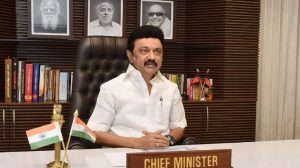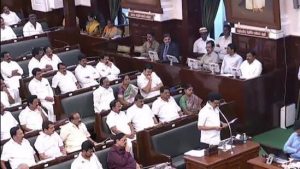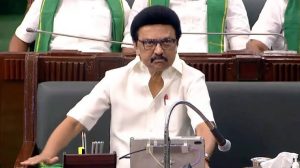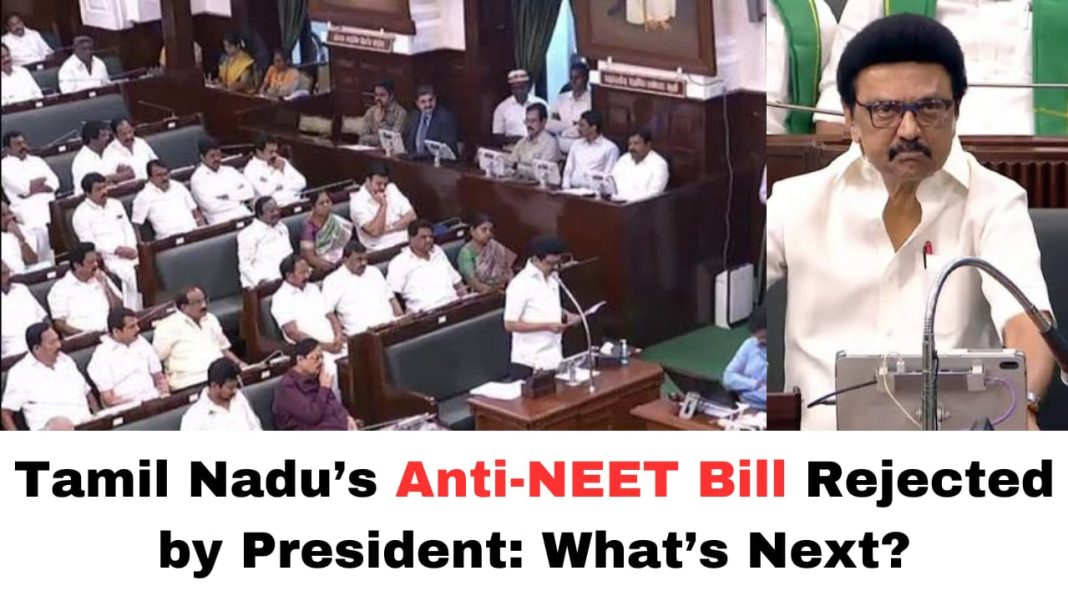Digital News Guru Tamil Nadu Desk:
In a significant development, President Droupadi Murmu has declined assent to Tamil Nadu’s bill seeking exemption from the National Eligibility cum Entrance Test (NEET), a move that has reignited debates over federalism, educational autonomy, and the accessibility of medical education in India.
Tamil Nadu’s efforts to secure an exemption from the National Eligibility cum Entrance Test (NEET) faced a significant setback as President Droupadi Murmu declined assent to the state’s exemption bill. Chief Minister M.K. Stalin conveyed this development to the state assembly, labeling it a “dark chapter in federalism” and criticizing the Union government for disregarding the will of Tamil Nadu’s people and their legislative assembly

Background of the NEET Exemption Bill
The Tamil Nadu Admission to Undergraduate Medical Degree Courses Act, 2021, was designed to permit medical admissions based solely on Class 12 examination scores, aiming to eliminate the necessity for NEET. The state assembly initially passed the bill in September 2021 and re-adopted it in 2022 after Governor R.N. Ravi returned it for reconsideration. Despite the state’s efforts to provide clarifications to various Union ministries, the bill was ultimately rejected by the central government.
State Government’s Response
Chief Minister M.K. Stalin expressed profound disappointment, labeling the rejection as a “dark chapter in federalism.” He accused the Union government of disregarding the will of Tamil Nadu’s people and the legislative assembly’s decision. Stalin announced plans for an all-party meeting on April 9 to deliberate on the state’s future course of action, emphasizing the detrimental impact of NEET on students from poor and rural backgrounds.
Historical Context and Student Impact
NEET has been a contentious issue in Tamil Nadu since its implementation in 2017. Critics argue that the exam disadvantages students from state boards and rural areas who may lack access to the resources necessary to compete effectively. The debate intensified following the tragic suicide of S. Anitha, a 17-year-old student who had challenged NEET in the Supreme Court, highlighting the immense pressure the exam places on aspirants.

Legal and Constitutional Considerations
The rejection of the NEET exemption bill underscores the complex interplay between state autonomy and central authority in India’s federal structure. Education falls under the Concurrent List of the Indian Constitution, allowing both state and central governments to legislate on the subject. However, in cases of conflict, central laws prevail. This framework has led to tensions when state policies diverge from national policies, as evidenced in the current scenario.
Future Implications
The Tamil Nadu government’s decision to convene an all-party meeting indicates a continued commitment to opposing NEET. Potential future actions may include approaching the Supreme Court to challenge the President’s decision or seeking alternative legislative measures. The outcome of these efforts could have significant implications for medical admissions policies not only in Tamil Nadu but across India, potentially setting precedents for other states seeking similar exemptions.
Conclusion
The President’s rejection of Tamil Nadu’s NEET exemption bill has reignited discussions on educational reforms, state autonomy, and the equitable access to professional courses. As the state government strategizes its next steps, the broader implications for federalism and the balance of power between state and central authorities remain critical points of consideration.

As the state government strategizes its next steps, the rejection of the NEET exemption bill underscores the ongoing tensions between state and central authorities over educational autonomy and the broader implications for federalism in India.
You May Also Read: India and UAE Partner to Develop Strategic Energy Hub in Sri Lanka








